Insurrectionary accounts of witnesses
The memories of Zbigniew Debski from the "Kilinsky" battalion
Occupation
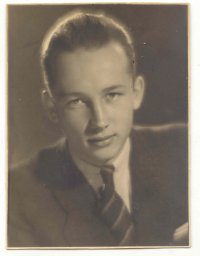 |
Zbigniew Debski
born on the 29th of November in 1922 in Lasin
Second Lieutenant of Home Army pseud."Zbych-Prawdzic"
the commander of the seventh unit of the third company "The Grey Ranks-Junior"
Home Army Battalion "Kilinsky "
prisoner number 298383
|
I was born on the 29th of November 1922 on Pomorze in the town called Lasin, near Grudziadz. My father, Emilian, had a drugstore there. My mum, Maria, brought me up together with my younger sisters, Irena and Alexandra. I graduated from a primary school in this town.
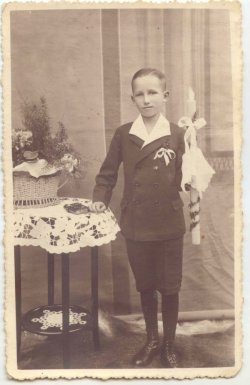
Zbigniew Debski 1932
As there was no secondary school parents sent me to another town. First I attended a secondary school in Aleksandrov Kujavsky ran by the Salesian priests and then I was moved into Gdynia-Orlovo. There I learnt in a secondary school ran by the Jesuits. Here in 1939 I got a secondary school certificate.
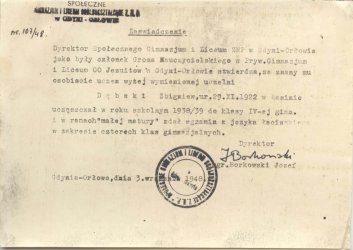
A report of obtaining a" minor" certificate of secondary school
The town where I was born and where I spent my childhood was located 12 kilometres far from the border of East Prussia. Because Grudziadz was near, and because there were lots of soldiers, and cavalry my father had many contacts with the military men that visited us. At the end of August 1939 the situation in our country became unclear. Nevertheless the officers that came to us, together with the chief of the Border Guard of that section, stated that there was no need to worry, and there was nothing in the air.
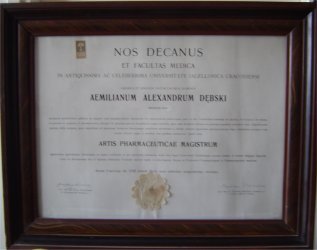
Father's university diploma
On the first of September at 5:00 a maid informed my dad that the German were closer. Father ran downstairs to his car to drive to Torun. It appeared that the tyre broke down. In this situation my father mounted a bike and escaped getting without any troubles to Torun. He did the right thing. Our family was socially active.
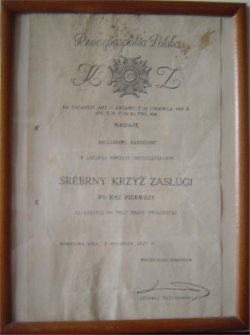
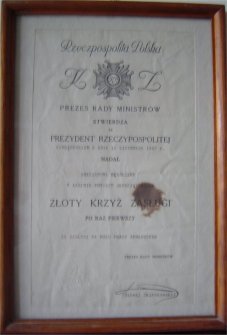
Father's orders
In our district quite a few Germans lived, and not everybody was pleased with my dad's behaviour .One of them, a doctor, had just advised my father to leave the place. As it was later revealed the German had lists of Polish patriots that they were to deal with. After the German army got in those people were shot dead on the first day. Me and my dad, we were on the list.
After the family consultation we decided to move eastward as the German army got deeper. We got the whole family into two cars and set off. Our father was jittery and was unable to drive. I took over his driving functions. Being in Torun in August I passed a test and got a driving licence.
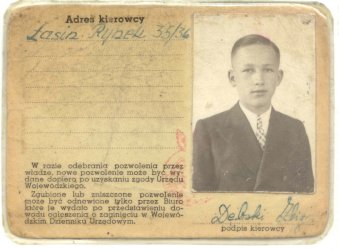
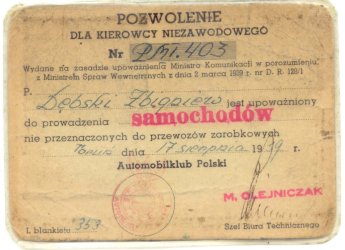
A driving licence
At night, on the 9th and 10th of September, we drove through Warsaw and headed further eastward. It was obvious what happened on the roads. Luckily, we managed to avoid any air raids. We got somewhere in the regions of Siedlce.
Petrol was becoming more and more troublesome. After the next consultation we decided that all the ladies: grandma, mum, sisters and cousinship should stay and we three: father, cousin and me, in one car, we would be driving further eastward with the intention of a probable getting to Zaleszczyki. After serious problems, undergoing various adventures during the trip like air raids, we got to Luck on the sixteenth of September. In Luck there was father's brother, that was the Inspector of the National Woods for the Volyn voivodeship. The next day, on the seventeenth of September the Russians arrived.
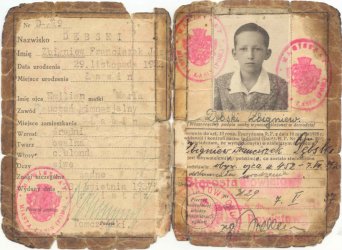
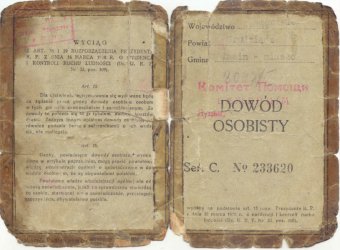
An identity card issued in 1937 to the fifteen-year-old Zbigniew Debski
On the reverse of the document a stamp of the Soviet Committee for Helping Fugitives in September 1939 in Luck. What the "help" looked like one can see for themselves reading the following relation excerpt:
Once again we found ourselves in a difficult situation. We tried to get back, but the front-line units halted us. The situation was complicated as we had taken a hunting gun. Since time immemorial our family cherished hunting traditions. Father knew Russian very well. For some time he studied in Kijov, though in fact he got a pharmaceutics diploma in Cracow. He started speaking Russian with soldiers. They went to the commander to ask what they should do with him.
I looked at the aggressors with interest. I was the first time I had met the Russian when some of them tried to get advice on what should be done with us, the so-called "dinner" was delivered. How did it look like? They brought a barrel of salted herrings. Every single soldier came to it one after another took the herring by the head and got rid of the excess of salt. Then he received a slice of brown bread. The meal was completed with water from a pump. And that's all.
In the dinnery-chaos we managed to escape. We got back to Luck. There we saw a new fashion style. Wives of officers that arrived from East paraded on the streets in the nightgowns as if they had had evening dresses. A car was, of course, taken from us, the gun had been buried by us in the forest some time earlier, and stayed there up to now. We decided to get back. Somehow behind Bug border, we experienced many different adventures. We travelled by train through Rowne, Kovel, Kostopol, Pinsk and finally we got near Bialystok that was seized by the Bolsheviks then. We looked for any contact so as to cross the border.
There were many "navigators". One of them committed himself to shepherd us across the border. We set at dark night. We followed him, carrying the remains of our belongings in a tiny rucksack. The guide was certain that it was hard for us to carry that rucksack and that he would help us. He introduced us into the forest and said that the border was right in front of us. And that we should keep going ahead. Suddenly we got all by ourselves in the forest darkness... and without the rucksack. Roaming for some time in the forest, finally we got out so as to got caught by the Russian soldiers.
We got imprisoned in Zabinka. We stayed there for two weeks. We didn't get enough to eat; though I made friends with the local vermin. Then we were transported to Kobryn. Here again we were in prison for some time. One day we were called to the prison chief for a talk. Father spoke Russian, while the chief, in the meantime, was browsing our documents, that were sent together with us to Zabinka. It was done with great difficulty as he was pretty well tanked up. As a result, the impatient Russian soldier handed down papers to my father and allowed us to go free.
We left that place hastily in great joy and happiness. We decided to eat something as quite a few weeks spent in fatal conditions were not unnoticed. Waiting for a meal in a restaurant father started arranging papers so as to distribute them to me and to my cousin. During this thorough cleaning a sheet of paper filled with Russian writing was dropped down. It was a letter instruction from those who caught us to the prison chief. It seemed that the two elder were to have been shot and the younger was to have been sent eastward. We didn't feel like eating. As fast as we could we ran away to Kobryn.
Then in Bialystok we met an honest guide who for a little fine helped us to cross the border near Malkinia, in Zreby Koscielne, to be precise. From Malkinia we got to Warsaw. Here we found some friends and took some steps to get in contact with family. As it turned out, mum with the rest of the family got back to Lasiny. After some time they were taken to Warsaw by father. Here we stayed at first in our friends' house and then dad rented a flat we lived, in turn, at Piekna, Nowogrodzka, Nalewky, Sulkiewicza and Grzybowska Street 47.
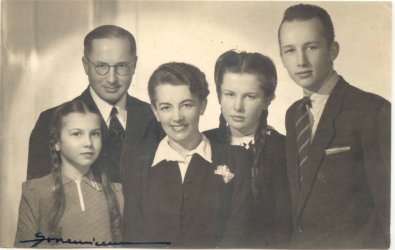
Zbigniew Debski with parents and sisters in 1942
Being accommodated in Warsaw I took up study. I was learning on the clandestine classes in a secondary school named after Adam Mickiewicz, and in the Second Level Building Construction School at Nowy Swiat 72, from which I graduated in 1943. That building construction school when finished made one a building construction technician. Having completed it I attended the Jagodzinsky Course of Technical Drawing that belonged to Architecture study. Lessons took place at Sniadeckich Street 10.
Secret contacts were made very early. At the end of November and at the beginning of December 1939 I was a liaison officer and an underground organization courier, the so-called Sky-Blue Division, that was set up by father's friend, the Border Guards Officer. It was one of the organizations that spontaneously appeared in the first days of occupation. I don't know what happened to it later on, whether it self-disbanded or whether it contributed to another units of the Polish Military Organiztaion.
Then thanked to the friends from the clandestine lessons and from the buliding construction school I continued the secret activities in the Association of Military Fighting (ZWZ). I took part in a military training on a basic level. We went for exercises in the field on Otvock line and one day even near Vyshkov. I graduated from a school for lower ranked commanders and then with the superiors' consent of my unit a secret officer cadet school, code-named "Belveder." I graduated from it ranked as a corporal cadet with the number 1030.
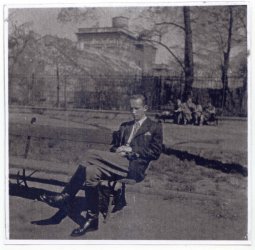
Zbigniew Dębski spring 1944
I had been in the "Kilinsky" battalion almost from its beginning that was since 1940.There I took my first soldier oath. Formerly the battalion was called "Vistula". The name was changed in 1942 for the battalion named after Colonel Jan Kilińsky. At the beginning the battalion amounted to more than 1000 poeple. At the end of the uprising in its ranks there were over 2000 soldiers. When the Uprising broke up the region, for which the battalion was responsible, included Nowy Swiat Street, Krolewska, Grzybowska Square, Marshalkowska and Jerozolimskie Avenues, that during the Uprising were called General Sikorski Avenues.
Zbigniew Dębski
translation: Malgorzata Szyszkowska
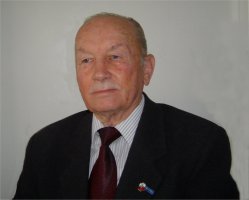
|
Zbigniew Debski
born on the 29th of November in 1922 in Lasin
Second Lieutenant of Home Army pseud."Zbych-Prawdzic"
the commander of the seventh unit of the third company "The Grey Ranks-Junior"
Home Army Battalion "Kilinsky "
prisoner number 298383
|
Copyright © 2011 Maciej Janaszek-Seydlitz. All rights reserved.












